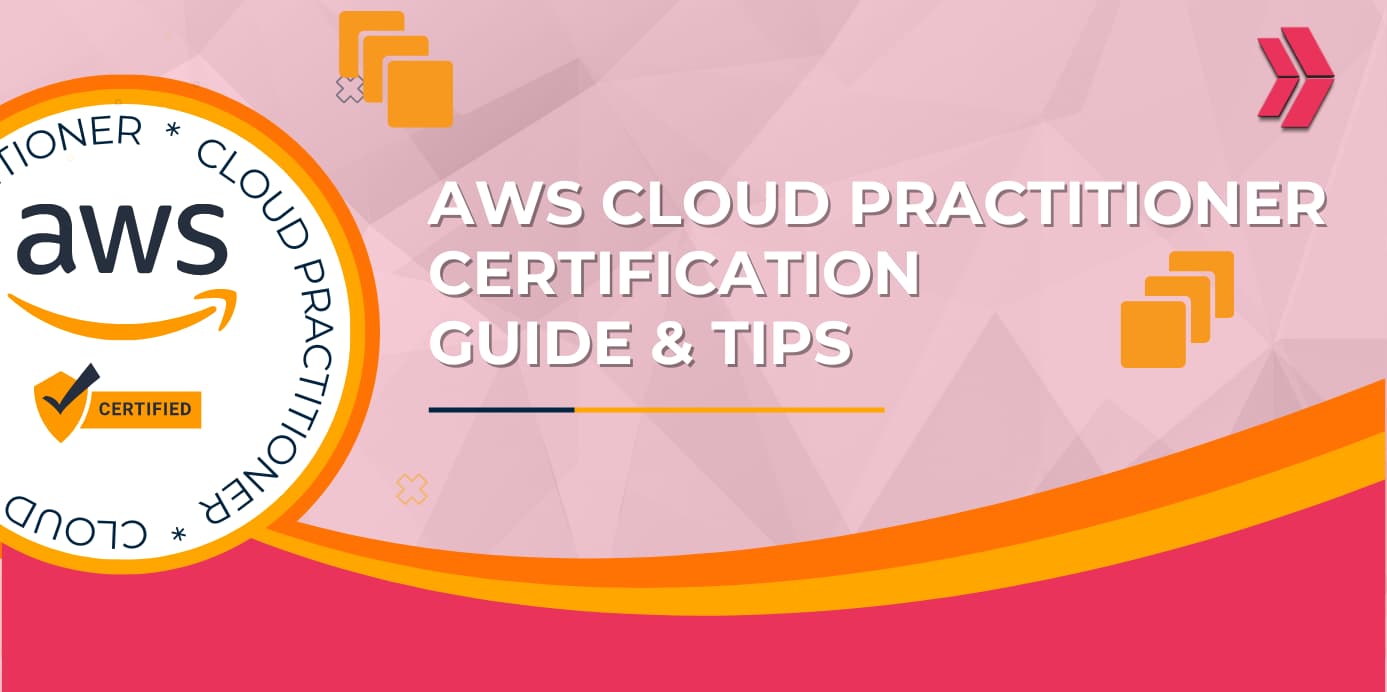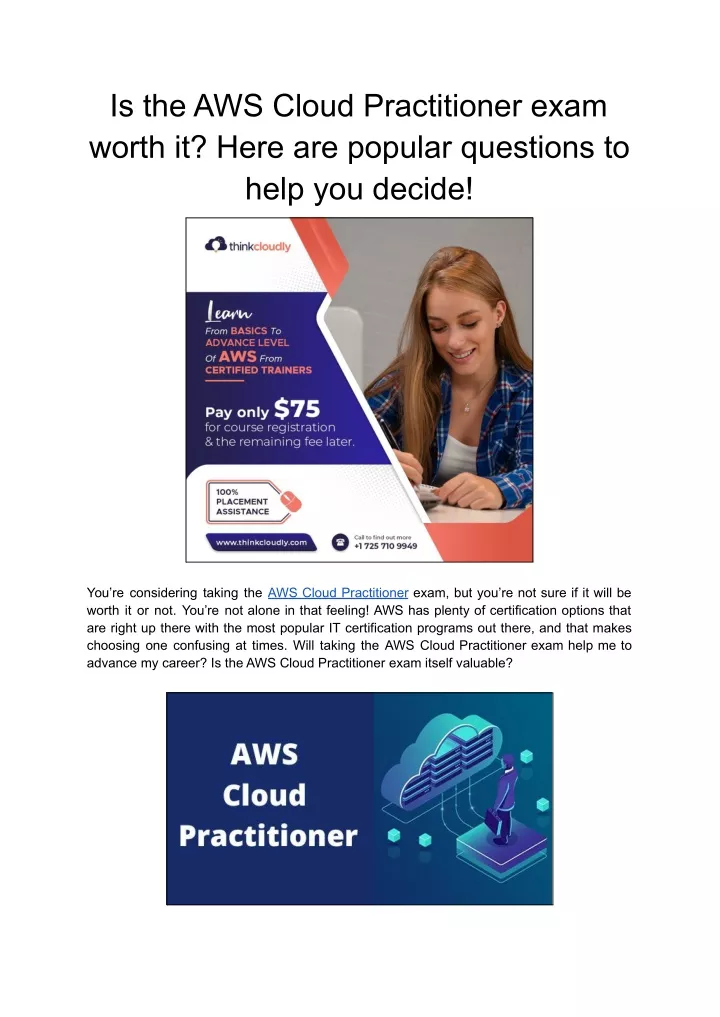Introduction to the AWS Cloud Practitioner Exam
The AWS Cloud Practitioner exam, a foundational-level certification, is designed for individuals interested in demonstrating their understanding of the AWS cloud platform. This exam focuses on key concepts, technologies, and best practices related to AWS cloud services, security, and pricing. Candidates should expect questions that cover various aspects of the AWS ecosystem, making it essential to have a solid grasp of cloud computing fundamentals and AWS services.
As you embark on your AWS Cloud Practitioner journey, it’s natural to wonder, “How hard is the AWS Cloud Practitioner exam?” The answer depends on your familiarity with cloud concepts, prior experience with AWS services, and the time and effort you invest in preparation. By understanding the exam’s scope, structure, and available resources, you can create a well-informed study plan and increase your chances of success.
Evaluating Your Readiness: Prerequisites and Skills
Before diving into the AWS Cloud Practitioner exam, it’s crucial to assess your readiness by evaluating your existing skills and knowledge. Although there are no strict prerequisites, having a basic understanding of cloud concepts and familiarity with AWS services can significantly impact the exam’s perceived difficulty.
Some recommended prerequisites and skills include the ability to navigate the AWS Management Console, comprehend core AWS services, and understand cloud concepts such as virtualization, scalability, and security. Additionally, having a general understanding of AWS’s shared responsibility model and billing models can be beneficial.
If you’re new to AWS or cloud computing, you might find the exam more challenging. However, with dedication, the right resources, and a well-structured study plan, you can bridge the knowledge gap and increase your chances of success.
Breaking Down the Exam Structure and Content
The AWS Cloud Practitioner exam, also known as CLF-C01, consists of multiple-choice and multiple-answer questions. The exam is designed to test your understanding of AWS cloud services, security, and pricing. Candidates have 90 minutes to complete the exam, and a passing score is typically set at 700 out of 1000 points.
The exam is divided into four main domains:
- Cloud Concepts: This domain covers the basics of cloud computing, including the benefits and challenges of cloud adoption, and how AWS supports various workloads and use cases.
- Security and Compliance: This section focuses on AWS security best practices, data encryption, and compliance requirements.
- Technology: This domain covers the core AWS services, such as Amazon S3, Amazon EC2, Amazon RDS, and AWS Lambda.
- Billing and Pricing: This section focuses on AWS billing models, pricing, and cost optimization strategies.
Understanding the structure and content of the AWS Cloud Practitioner exam will help you create a targeted study plan and allocate your time effectively.
Strategies to Overcome Exam Challenges
Tackling the AWS Cloud Practitioner exam can be less daunting when you have a solid strategy in place. Here are some effective techniques to help you prepare:
- Utilize official AWS resources: The AWS website offers a variety of study materials, including whitepapers, FAQs, and documentation. Make the most of these resources to build a strong foundation in AWS cloud services, security, and pricing.
- Take advantage of free training: AWS Skill Builder provides free, self-paced digital training courses, including one specifically designed for the Cloud Practitioner exam. Completing these courses can help you better understand the exam content and format.
- Participate in user groups and forums: Engaging with the AWS community can provide valuable insights, tips, and support. Join AWS user groups, webinars, and forums to connect with other professionals and learn from their experiences.
- Emphasize practice exams: Practice exams are essential for gauging your readiness and identifying areas for improvement. Use them to familiarize yourself with the exam format, time limits, and question styles.
- Create a study plan: A well-structured study plan can help you stay organized and focused. Break down the exam content into manageable sections, allocate time for each topic, and track your progress.
By incorporating these strategies, you can better prepare for the AWS Cloud Practitioner exam and increase your chances of success.
Real-Life Experiences and Testimonials
Hearing from individuals who have taken the AWS Cloud Practitioner exam can provide valuable insights into the exam’s challenges and rewards. Here are a few testimonials:
“I found the AWS Cloud Practitioner exam to be a great introduction to the AWS ecosystem. Although I had some experience with cloud computing, the exam helped me better understand AWS services and best practices. I used a mix of official AWS resources, free training, and practice exams to prepare, which I found to be very effective.”
– Jane Doe, Cloud Engineer
“I was initially intimidated by the AWS Cloud Practitioner exam, but with dedication and the right resources, I was able to pass. I would recommend taking advantage of AWS Skill Builder courses and participating in user groups to get a better understanding of the exam content and format.”
– John Doe, IT Consultant
These testimonials demonstrate that, while the AWS Cloud Practitioner exam can be challenging, it is possible to succeed with the right mindset and resources. By learning from the experiences of others, you can better prepare for your own exam journey.
Maintaining and Expanding Your AWS Knowledge
Passing the AWS Cloud Practitioner exam is a significant milestone, but it’s only the beginning of your journey in the cloud computing industry. To stay current with the ever-evolving AWS ecosystem and improve your career prospects, it’s essential to maintain and expand your AWS knowledge.
One effective way to do this is by engaging in continuous learning. AWS offers various certification tracks and learning paths designed for different roles and expertise levels. By exploring these resources, you can deepen your understanding of AWS services, best practices, and emerging trends.
Additionally, consider attending AWS events, webinars, and conferences to network with other professionals and learn from experts in the field. Participating in AWS user groups and forums can also help you stay up-to-date on the latest AWS developments and exchange ideas with like-minded individuals.
Maintaining and expanding your AWS knowledge will not only benefit your career but also ensure that you are well-equipped to tackle new challenges and opportunities in the cloud computing landscape.
Is the AWS Cloud Practitioner Exam Right for You?
When considering whether to take the AWS Cloud Practitioner exam, it’s essential to evaluate your individual learning style, career goals, and current skill level. This exam is designed for those who are new to the AWS cloud platform or have limited experience working with cloud services. It serves as an excellent entry point for those interested in understanding the fundamental concepts and best practices associated with AWS cloud computing.
One of the primary benefits of obtaining the AWS Cloud Practitioner certification is the validation of your foundational knowledge in AWS cloud services. This certification can help demonstrate your commitment to learning and staying current with emerging technologies, making you a more attractive candidate to potential employers. Furthermore, the certification can act as a stepping stone for pursuing more advanced AWS certifications in the future, such as the AWS Solutions Architect or AWS DevOps Engineer certifications.
However, it’s essential to recognize that preparing for the AWS Cloud Practitioner exam may present some challenges. As with any certification exam, it requires a time investment to study and understand the material. Additionally, the exam covers a broad range of topics, including cloud concepts, security, and pricing, which can be overwhelming for those new to the AWS ecosystem.
To overcome these challenges, it’s crucial to create a study plan that prioritizes the main domains and topics covered in the exam. Utilizing official AWS resources, such as the AWS Whitepapers, FAQs, and documentation, can provide a solid foundation for understanding the core concepts. Furthermore, taking advantage of free training opportunities, such as AWS’s online courses and webinars, can help reinforce your knowledge and build confidence in your abilities.
Participating in user groups and forums can also be invaluable in your preparation for the AWS Cloud Practitioner exam. Engaging with others who have gone through the certification process can offer unique insights, strategies for success, and potential study partners. Additionally, practice exams can help you gauge your readiness and identify areas where further study is needed.
In conclusion, the AWS Cloud Practitioner exam is an excellent choice for those seeking to demonstrate their foundational knowledge in AWS cloud services. While it does require a time investment and a willingness to learn, the rewards of successful completion can lead to improved career prospects and a deeper understanding of the ever-evolving AWS ecosystem. By embracing the AWS Cloud Practitioner exam journey and utilizing available resources, you can set yourself up for success and become a valuable asset in the cloud computing industry.
Conclusion: Embracing the AWS Cloud Practitioner Exam Journey
In conclusion, the AWS Cloud Practitioner exam is an essential step for those interested in demonstrating their foundational knowledge in the AWS cloud platform. While the exam covers a wide range of topics, including key concepts, technologies, and best practices related to AWS cloud services, security, and pricing, it is designed to be accessible to entry-level professionals and those new to the AWS ecosystem.
To prepare for the AWS Cloud Practitioner exam, it’s crucial to assess your readiness by evaluating your current skill level and prerequisites. Familiarity with cloud concepts, basic AWS services, and AWS Management Console navigation can significantly impact the exam’s difficulty. By utilizing official AWS resources, taking advantage of free training opportunities, and participating in user groups and forums, you can build a solid foundation of knowledge and develop effective strategies for success.
Real-life experiences and testimonials from individuals who have taken the AWS Cloud Practitioner exam highlight the challenges and rewards of the certification process. While some may find the exam’s breadth of topics intimidating, many report a sense of accomplishment and pride upon successful completion. Moreover, maintaining and expanding your AWS knowledge after passing the exam can help you stay current with the ever-evolving AWS ecosystem and improve your career prospects.
Therefore, when considering whether the AWS Cloud Practitioner exam is right for you, it’s essential to view it as an opportunity for growth and learning, rather than an insurmountable challenge. By embracing the exam journey and utilizing available resources, you can set yourself up for success and become a valuable asset in the cloud computing industry. Remember, the AWS Cloud Practitioner certification is an investment in your future, and the rewards of successful completion can lead to improved career prospects and a deeper understanding of the AWS ecosystem.






